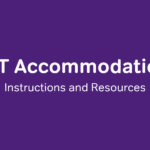Besides the questions themselves, the greatest challenge on the SAT for most students is finishing within the time allotted for each section. Accommodations are available for students who qualify for them, but most students are expected to complete the test within the the regular time limits.
There are ways to help you improve your speed on the SAT. Today, we’re going to cover some general tips, as well as address some specific time wasters in each section of the SAT and how to minimize their drain on your time.
General Tips
- Make sure you’re comfortable with the test. This means you should study and be aware of all the question types you will see. There should be no surprises on test day!
- Figure out your time deficit. Start by using a stopwatch to time how long it takes you to get through a section of the test at your own pace. Find the difference between this time and the actual time allotted on the test. This is your personal time deficit. Your goal should be to shrink this number as you continue to practice. This approach gamifies your studying, which makes it more fun!
- Practice, practice, practice! The more you practice with a timer, the easier it will be to work within the time. You’ll also get a good idea of what the time limits feel like, which will help you manage your time well on test day.
Have you been practicing your tail off but still struggling with a particular section of the test? Here are typical time wasters from each section and how to deal with them.
Reading
Time wasters:
- Spacing out and having to re-read the passage
- Hunting for line references over and over
Solutions:
- Annotate the passage as you read. Reading actively by taking notes (paper or mental) and underlining and circling important phrases or words will help keep your attention on passages that may be dull or difficult to read.
- When a question references a word or selection from the passage, underline it! This makes it much easier to move back and forth between the passage and question without losing your spot. This strategy is especially helpful for the citing evidence questions, which reference four different sections of the passage.
Writing
Time wasters:
- Reading the entire passage before answering any questions.
- Spending too long debating between answers.
Solutions:
- The Writing section questions are context-based, but many can be answered using only one or two sentences within the passage. Save yourself some time by answering these questions as you read.
- The Writing section is the only section on the new SAT which contains more questions than there are minutes to answer them. This means you should be spending less than a minute on each one. If you are truly stuck, make a best guess and return to that question if you have time. Do not leave any questions blank!
Math
Time wasters:
- Trying to do too much mental math and/or using the calculator unnecessarily.
- Doing more work than is required to answer the question.
- Trying to tackle too much at once.
Solutions:
- On the no-calculator section, don’t be afraid to jot down calculations. Accuracy is important, and no one is going to judge your scratch work. If you can add numbers faster by writing them down than you can in your head, do it. On the calculator section, don’t assume every question requires you to use a calculator. Also, it might be a good idea to review the times tables and perfect squares and cubes. You don’t want to spend precious seconds punching 8 x 7 into the calculator.
- Double check what the question is asking you to find. Many questions on the test will ask for something other than just the variable. You don’t want to painstakingly create and solve an equation, only to realize the question was only asking for the equation itself.
- When working through a word problem, write each step down and work through the question one sentence at a time. Trying to do too much at once in order to speed through the problem can actually slow you down and increases your risk of making a mistake.
Essay
Time wasters:
- Spacing out and having to re-read the passage or re-write part of the essay.
- Starting your essay with no plan.
Solutions:
- Much like the Reading section, the Essay section goes a lot smoother if you annotate as you read. The new SAT essay requires you to discuss how the author of a passage makes his or her point. Use your reading time to find evidence of rhetorical devices in the passage that you might be able to use in your essay.
- Although it may be incredibly tempting to start writing your essay as soon as you’ve finished reading the passage, you should resist this urge. Take a few minutes to review your notes and plan what evidence you want to use in your essay. Ideally, you should have a thesis and a basic outline before you begin the essay itself. Planning the essay can actually save you time in the long run. It prevents you from having to stop writing to think about what should come next. It also means you won’t have to erase and rewrite large chunks of your writing.
Overall
Time waster:
- Panic!
Solution:
- When you feel that creeping sense of panic sneaking up on you because you’re running out of time or you don’t know an answer, stop working, sit up straight, and take a deep breath. Then, reassess what needs to be done and decide on a strategy to approach it.
There’s nothing you can do to stop time from ticking, but the above strategies can help you stamp out the habits that tend to eat away at your time on the SAT. If you treat the time limit as just another topic to study for the test, you’ll be able to minimize your anxiety on test day and focus on the questions, not the clock.






Leave a Reply